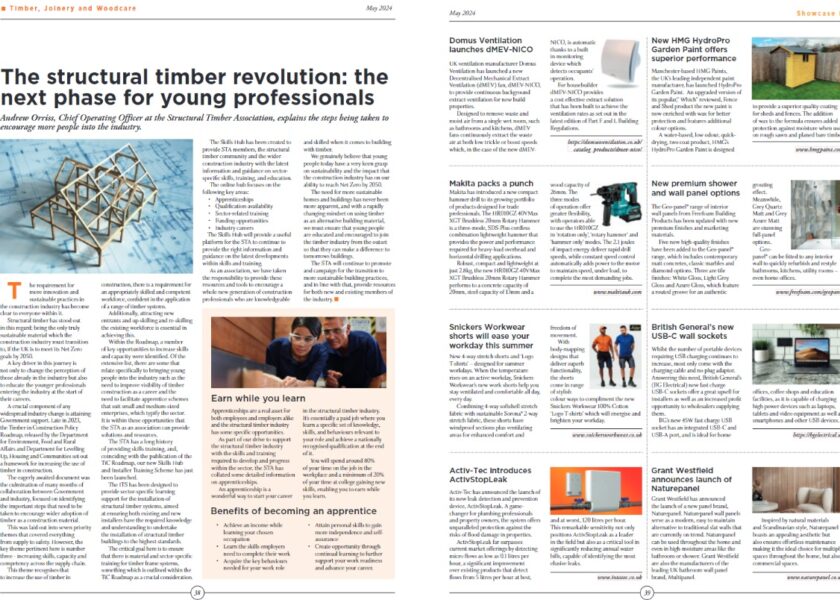The Structural Timber Revolution: The Next Phase Of Young Professionals
20/05/2024

The requirement for more innovation and sustainable practices in the construction industry has become clear to everyone within it. Structural timber has stood out in this regard, being the only truly sustainable material which the construction industry must transition to, if the UK is to meet Net Zero by 2050. A key driver in this journey is not only to change the perception of those already in the industry but also to educate the younger professionals entering the industry at the start of their careers. Here, Andrew Orriss, Chief Operating Officer at the Structural Timber Association (STA) explains the steps that the STA are taking to encourage more people to enter the industry.
A crucial component of any widespread industry change is attaining Government support. Late in 2023, the Timber in Construction (TiC) Policy Roadmap, released by the Department for Environment, Food and Rural Affairs (DEFRA) and Department for Levelling Up, Housing and Communities (DLUHC) set out a framework for increasing the use of timber in construction.
The eagerly awaited document was the culmination of many months of collaboration between Government and industry, focused on identifying the important steps that need to be taken to encourage wider adoption of timber as a construction material. This was laid out into seven priority themes that covered everything from supply to safety. However, the key theme pertinent here is number three – increasing skills, capacity and competency across the supply chain.
This theme recognises that to increase the use of timber in construction, there is a requirement for an appropriately skilled and competent workforce, confident in the application of a range of timber systems. Additionally, attracting new entrants and up-skilling and re-skilling the existing workforce is essential in achieving this.
Within the Roadmap, a number of key opportunities to increase skills and capacity were identified. Of the extensive list, there are some that relate specifically to bringing young people into the industry such as the need to improve visibility of timber construction as a career and the need to facilitate apprentice schemes that suit small and medium-sized enterprises, which typify the sector. It is within these opportunities that the STA as an association can provide solutions and resources.
The STA has a long history of providing skills training, and aptly coinciding with the launch of the TiC Roadmap, our new Skills Hub and Installer Training Scheme (ITS) has been launched. The ITS has been designed to provide sector-specific learning support for the installation of structural timber systems, aimed at ensuring both existing and new installers have the required knowledge and understanding to undertake the installation of structural timber buildings to the highest standards. The critical goal here is to ensure that there is material and sector-specific training for timber frame systems, something which is outlined within the TiC Roadmap as a crucial consideration.
The Skills Hub has been created to provide STA members, the structural timber community and the wider construction industry with the latest information and guidance on sector-specific skills, training, and education.
The online hub focuses on the following key areas:
- Apprenticeships
- Qualification availability
- Sector-related training
- Funding opportunities
- Industry Careers
The Skills Hub will provide a useful platform for the STA to continue to provide the right information and guidance on the latest developments within skills and training.
As an association, we have taken the responsibility to provide these resources and tools to encourage a whole new generation of construction professionals who are knowledgeable and skilled when it comes to building with timber. We truly believe that young people today have a very keen grasp on sustainability and the impact that the construction industry has on our ability to reach Net Zero by 2050.
The need for more sustainable homes and buildings has never been more apparent, and with a rapidly changing mindset on using timber as an alternative building material, we must ensure that young people are educated and encouraged to join the timber industry from the outset so that they can make a difference to tomorrows buildings. The STA will continue to promote and campaign for the transition to more sustainable building practices, and in line with that, provide resources for both new and existing members of the industry.
Go to page 38 to read full article here